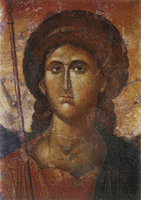|

|
|
 Click to listen to a Greek Orthodox chanting
Click to listen to a Greek Orthodox chanting
|
The people of
Cyprus represent two main ethnic groups, Greek and Turkish. The
Greek Cypriots, who constitute about four-fifths of the island's
population, descended from a mixture of aboriginal inhabitants
and immigrants from the Peloponnese
who colonized Cyprus starting about 1200 BC and assimilated
subsequent settlers up to the 16th century.
The language of
the majority is Greek. English is widely spoken and understood
as a second language. Illiteracy is extremely low, the result of
an excellent educational system.
|









